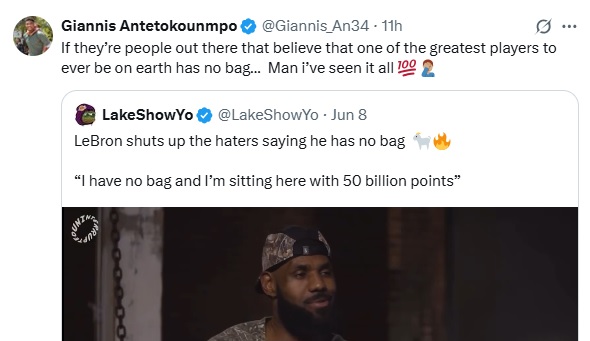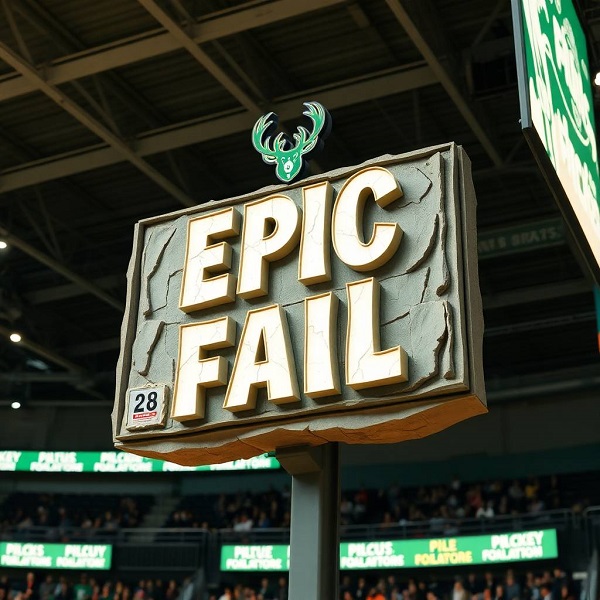
When discussing the NBA’s elite, Giannis Antetokounmpo and LeBron James frequently top the conversation. Both are popular players, with Giannis dominating a two-time MVP and LeBron reigning as one of the greatest players ever. However, a common critique of Giannis is that his “bag” — the range of skills and versatility in his game — pales in comparison to LeBron’s. Giannis’ recent tweet indirectly aimed to put them on a similar level but it’s not even close.
Scoring: Power vs. Precision
Giannis Antetokounmpo
Giannis, known as the “Greek Freak,” relies heavily on his physical gifts. Standing at 6’11” with a 7’3″ wingspan, he’s a force in the paint. His scoring is built on:
- Rim Attacks: Giannis is arguably the best in the league at driving to the basket. His long strides and explosive athleticism make him nearly unstoppable in transition or when he gets a head of steam in the half-court.
- Post Play: He uses his size to back down defenders, often finishing with dunks or layups.
- Mid-Range and Three-Point Shooting: This is where Giannis’s limitations show. His jump shot remains inconsistent. In the 2024-25 season, he’s shooting around 29% from three on low volume (1-2 attempts per game) and rarely takes mid-range shots, preferring to attack the rim. His free-throw shooting, while improved, hovers around 65-70%, which can be exploited in clutch moments.
Giannis’s scoring is devastatingly effective but one-dimensional. Defenses often sag off him, daring him to shoot, which limits his offensive repertoire compared to players with more refined jumpers.
LeBron James
LeBron, at 6’9″ and 250 pounds, combines physicality with finesse. His scoring arsenal is far more diverse:
- Driving and Finishing: Like Giannis, LeBron is a freight train in transition and can finish through contact at the rim. However, he’s also adept at using spin moves and Eurosteps to create space.
- Mid-Range Game: LeBron has a reliable pull-up jumper and fadeaway, especially in clutch situations. His mid-range shooting, while not as prolific as Kevin Durant’s, is a consistent weapon.
- Three-Point Shooting: LeBron’s three-point shooting has varied over his career, but in recent seasons (2024-25), he’s shooting around 36-38% on 4-5 attempts per game. This forces defenses to respect his range, opening up driving lanes.
- Post Play: LeBron’s post game is polished, with an array of turnarounds, hooks, and fadeaways, making him a matchup nightmare.
LeBron’s ability to score from all three levels — inside, mid-range, and beyond the arc — gives him a significant edge. Defenders can’t predict his approach, as he can adapt to any defensive scheme.
Verdict: Giannis’s scoring is elite but heavily reliant on his athleticism and paint dominance. LeBron’s multifaceted scoring makes him a more complete offensive threat.
Playmaking: Vision and Execution
Giannis Antetokounmpo
Giannis has grown into a solid playmaker, averaging around 6-7 assists per game in recent seasons. His passing is effective in specific contexts:
- Drive-and-Kick: Giannis often draws multiple defenders on drives, allowing him to kick out to open shooters.
- Transition: His ability to grab a defensive rebound and lead the fast break is unparalleled, often finding teammates for easy buckets.
- Limitations: Giannis’s playmaking is somewhat predictable. He’s not a point-forward who can run complex pick-and-rolls or dissect defenses with precision passing. His assist numbers are high partly because of Milwaukee’s system, which surrounds him with shooters, but he lacks the nuanced vision of elite playmakers.
LeBron James
LeBron is one of the best passers in NBA history, often compared to Magic Johnson. His playmaking is a cornerstone of his game:
- Court Vision: LeBron’s ability to read defenses is uncanny. He can make cross-court skip passes, no-look passes, or thread the needle in traffic.
- Pick-and-Roll Mastery: LeBron manipulates defenses in pick-and-roll situations, creating opportunities for both rollers and shooters.
- Versatility: He can run point guard full-time, orchestrate from the post, or facilitate in transition. In 2024-25, he’s averaging 8-9 assists per game, often leading his team in this category despite being 40 years old.
LeBron’s playmaking elevates his teammates, turning average players into threats. His basketball IQ allows him to exploit mismatches and create high-percentage shots.
Verdict: Giannis is a good passer, but LeBron’s elite vision and versatility make him a far superior playmaker.
Defense: Impact and Adaptability
Giannis Antetokounmpo
Giannis is a defensive juggernaut, having won the 2020 Defensive Player of the Year award. His defensive strengths include:
- Rim Protection: His length and timing make him an elite shot-blocker, averaging 1.5-2 blocks per game.
- Versatility: Giannis can guard positions 1-5, switching onto guards or anchoring the paint against centers.
- Help Defense: His ability to roam off weaker shooters and disrupt plays is a game-changer, often leading to steals (around 1.2 per game).
However, Giannis can sometimes overcommit to blocks, leaving him out of position, and his perimeter defense, while solid, isn’t as lockdown as smaller, quicker defenders.
LeBron James
LeBron’s defensive prime was earlier in his career (2008-2016), but even in 2025, he remains a plus defender:
- Versatility: LeBron can still guard multiple positions, though he’s less likely to take on elite perimeter players full-time at this stage.
- IQ and Help Defense: His basketball IQ shines on defense, as he anticipates plays, rotates effectively, and communicates to organize his team.
- Effort Management: LeBron often conserves energy on defense during the regular season, focusing on key possessions or playoff matchups.
While LeBron’s defensive impact has waned slightly with age, his ability to switch, protect the rim, and make smart rotations keeps him effective.
Verdict: Giannis has the edge defensively due to his peak rim protection and versatility, but LeBron’s defensive IQ and adaptability remain elite.
Overall Versatility: The “Bag” Comparison
The term “bag” refers to a player’s range of skills and ability to adapt to different situations. Giannis’s bag is deep in specific areas:
- Unstoppable in transition and paint scoring. Well, he used to be unstoppable.
- Elite defensive impact. Well, until he won DPOY and then forgot defence.
- Improving but limited playmaking. Unless it is a game that matters.
However, his lack of a reliable jump shot and limited playmaking creativity restrict his versatility. Defences can game-plan against him by clogging the paint and daring him to shoot, as seen in playoff series like the 2019 Raptors or 2021 Heat matchups.
LeBron’s bag, by contrast, is one of the deepest in NBA history:
- Scores efficiently from all three levels.
- Elite playmaking that elevates any team.
- High-level defense, even if not at its peak.
- Ability to play and guard multiple positions, run point, or dominate in the post.
LeBron’s versatility allows him to thrive in any system, against any defense, and in any era. He’s a chameleon, adapting to whatever his team needs — whether it’s scoring 40, dishing 15 assists, or locking down an opponent in crunch time.
Contextual Factors: Age and Era
It’s worth noting that Giannis (30 years old in 2025) is in his prime, while LeBron (40) is in the twilight of his career. Despite this, LeBron’s skill set remains more polished. Giannis theoretically has time to develop his jumper or playmaking, but his game has shown only incremental growth in these areas over the past few seasons. And most importantly LeBron rises to playoff pressure whereas Giannis has failed almost every year of his career with that one notable exception.
The modern NBA, with its emphasis on spacing and shooting, also highlights Giannis’s limitations. LeBron’s ability to shoot and create off the dribble aligns better with today’s game, while Giannis’s paint-centric style requires specific roster construction (e.g., shooters like Middleton and Lopez) to maximize his impact. Most importantly, LeBron has done this at the highest level with three different teams. Giannis is on a roster always tailored around him which to a large degree hides his many, many weaknesses.
So no Giannis, you won’t get away with this
Giannis Antetokounmpo’s physical dominance during the regular season make him a perennial MVP candidate. However, when comparing his “bag” to LeBron James’s, the gap is clear. LeBron’s ability to score from anywhere, make every type of pass, and adapt to any role gives him a level of versatility that Giannis has yet to match. While Giannis’s raw power and athleticism are impressive in easy games, his lack of a consistent outside shot and limited playmaking creativity mean his game is less complete. And most importantly his game has not developed and doesn’t deliver when it counts. While LeBron posts career breaking improvements in efficiency at 40, Giannis hits career lows in ft% and 3pt% as well a serious deterioration of his defensive effort.
LeBron’s all-around mastery, even at 40, sets a standard that few, including Giannis, can rival. As Giannis continues to refine his game, he may close the gap, but for now, LeBron’s bag remains the deeper and more versatile of the two. And it’s not even close.

